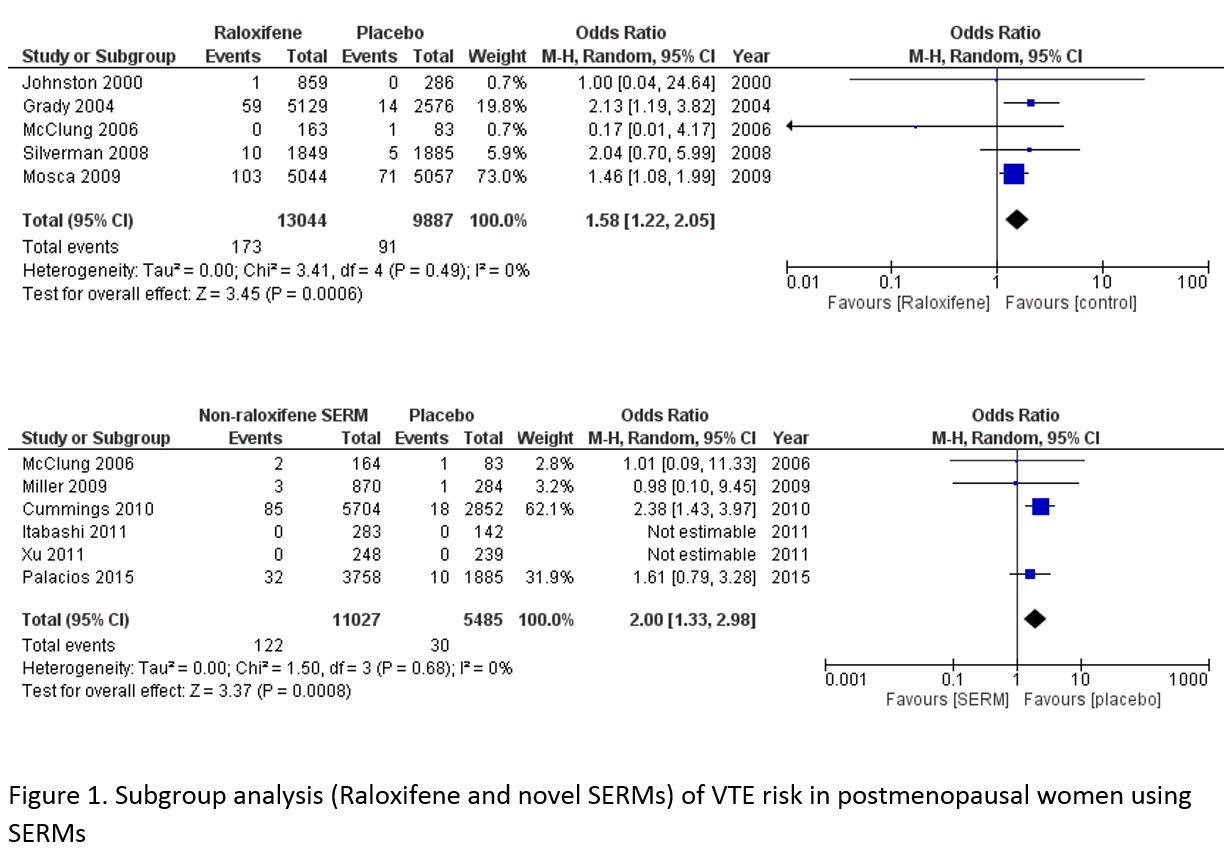Session Information
Date: Tuesday, October 23, 2018
Title: 5T087 ACR Abstract: Osteoporosis & Metabolic Bone Disease–Basic & Clinical Science (2808–2813)
Session Type: ACR Concurrent Abstract Session
Session Time: 2:30PM-4:00PM
Background/Purpose:
Selective Estrogen Receptor Modulators (SERMs) are one of the available treatment options for postmenopausal osteoporosis. Since Raloxifene was first introduced on 1997 for post-menopausal osteoporosis, studies have shown increased risk of venous thromboembolism (VTE). However, some more recent studies have reported no significant increase in risk. Lasofoxifene and Bazedoxifene (approved for postmenopausal osteoporosis in the US by FDA on 2005 and 2013, respectively) are relatively newer SERMs that are generally well-tolerated and have similar efficacy while also reducing coronary heart disease and stroke risk, making them desirable options for postmenopausal women. However, studies have variable results when it comes to VTE risk with these novel SERMs. The aim of this study was to perform a quantitative meta-analysis of randomized controlled trials (RCTs) to assess the risk of VTE with SERMS.
Methods:
Relevant trials were identified through electronic searches of PubMed, EMBASE, Cochrane library and Google Scholar as well as from references of the included studies. Only RCTs comparing SERMs with placebo were included. Data from the trials pertinent to VTE as an adverse event were extracted. A subgroup analyses was performed to identify if any difference existed between Raloxifene and other newer SERMs.
Results:
In 11 RCTs involving 39,920, the risk of VTE with any SERM was significantly increased [odds ratio (OR) 1.7, 95 % CI 1.37-2.12, p<0.001, I2=0%] compared to placebo (Fig-1). On a subgroup analysis, this risk was even higher with newer SERMs [OR 2.0, 95 % CI 1.33-2.98, p<0.001, I2=0%] (Fig-2). The risk of VTE with Raloxifene was higher than placebo but lower compared to other SERMs [OR 1.58, 95 % CI 1.22-2.05, p<0.001, I2=0%] (Fig-2).
Conclusion:
The risk of VTE seems to be elevated with any of the SERMs. Even though the newer SERMs have been reported to have better cardiovascular risk profiles (reduction in heart disease and stroke) compared to Raloxifene, the risk of VTE seems to be similar or may be even higher in these agents.
To cite this abstract in AMA style:
Dhital R, Poudel D, Timilsina B, Lynn T, Peters C, Oladiran O, Parajuli P, Paudel P, Donato A. Risk of Venous Thromboembolism with Selective Estrogen Receptor Modulators for Postmenopausal Osteoporosis: A Meta-Analysis of Randomized Trials [abstract]. Arthritis Rheumatol. 2018; 70 (suppl 9). https://acrabstracts.org/abstract/risk-of-venous-thromboembolism-with-selective-estrogen-receptor-modulators-for-postmenopausal-osteoporosis-a-meta-analysis-of-randomized-trials/. Accessed .« Back to 2018 ACR/ARHP Annual Meeting
ACR Meeting Abstracts - https://acrabstracts.org/abstract/risk-of-venous-thromboembolism-with-selective-estrogen-receptor-modulators-for-postmenopausal-osteoporosis-a-meta-analysis-of-randomized-trials/


